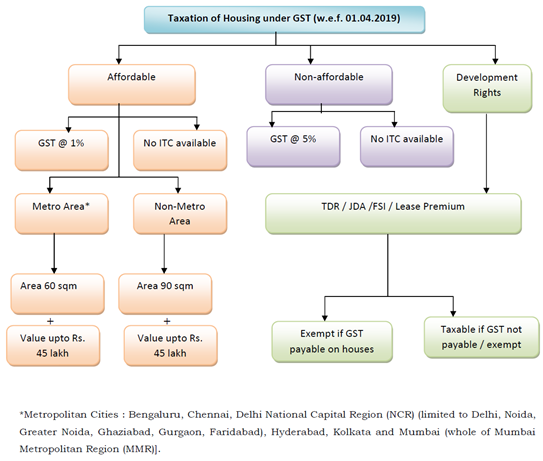Dr. Sanjiv Agarwal, FCA, FCS

The 33rd meeting of GST Council was held on 20.02.2019 which was later adjourned to 24.02.2019. In a major move, GST Council recommended a much needed breather to real estate sector so much so that it would be beneficial to both – builders-developers as well as buyers and this sector, already reeling under slow down / recession will be able to see demand picking up due to lower GST. The rates of GST on under construction housing segment has been proposed to be reduced to 1% for affordable housing projects and 5% for at non-affordable housing projects but with the rider that no input tax credit shall be allowed. This shall be applicable from April 1, 2019 for which necessary notifications / circulars shall be issued after the scheme is finalized. Similarly, intermediate tax on development rights like TDR, JDA, lease premium FSI etc shall be exempt where such residential property has already suffered GST. For this purpose, ‘affordable housing’ has been defined based on area and city.
Recommendations of 33rd GST Council Meeting
The 33rd GST Council meeting held on 20.02.2019 and later adjourned to 24.02.2019 made the following recommendations:
♦ Extension in due date of Form GSTR 3B
> The due date of filing of return in Form GSTR 3B for the month of January, 2019 was extended upto 22.02.2019.
> However, for registered persons whose principal place of business is in the State of Jammu and Kashmir the last date was extended to 28.02.2019.
♦ Change in GST rates for Real estate (housing)
> Under construction properties or ready-to-move-in flats where completion certificate has not been issued at the time of sale (other than affordable housing segment): from 12% (with ITC) to 5% (without ITC)
> Affordable housing segment: from 8% (with ITC) to 1% (without ITC)
[Affordable house will mean a residential house/ flat of carpet area of upto 90 sqm in non-metropolitan cities/ towns and 60 sqm in metropolitan cities* having value upto Rs. 45 lacs (both for metropolitan and non-metropolitan cities)].
*Metropolitan Cities are Bengaluru, Chennai, Delhi National Capital Region (NCR) (limited to Delhi, Noida, Greater Noida, Ghaziabad, Gurgaon, Faridabad), Hyderabad, Kolkata and Mumbai (whole of Mumbai Metropolitan Region (MMR)].
To ascertain the eligibility as ‘affordable housing project’ , it is important to note that both the conditions of area and value must be satisfied. If any of them is not fulfilled, the project will not qualify as ‘affordable housing’.
The proposed amendment shall not apply to :
- Non affordable housing projects
- Commercial projects
In case of partly commercial and party residential projects, the applicable rate to unit based on its commercial or residential nature shall apply, i.e., 12% for commercial and 5% for residential portion.
The amendment is expected to bring in following advantages to all stakeholders :
(i) The buyer of house gets a fair price and affordable housing gets very attractive with GST @ 1%.
(ii) Interest of the buyer/consumer gets protected; ITC benefits not being passed to them shall become a non-issue.
(iii) Cash flow problem for the sector is addressed by exemption of GST on development rights, long term lease (premium), FSI etc.
(iv) Unutilized ITC, which used to become cost at the end of the project gets removed and should lead to better pricing.
(v) Tax structure and tax compliance becomes simpler for builders.
Change in GST taxation for real estate at a glance
The new rates shall be applicable from 01.04.2019 for which notification shall be issued.
♦ GST exemption on TDR/ JDA, long term lease (premium), FSI:
> Intermediate tax on development right, such as Transfer of Development Rights (TDR), Joint Development Agreement (JDA), lease (premium), Floor Space Index (FSI) shall be exempted only for such residential properties on which GST is payable.
As the elections draw closer, we can expect few more GST Council meetings in near future wherein taxpayer’s concerns may be addressed appropriately.






